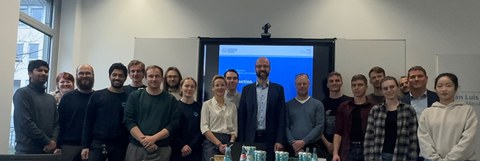Feb 09, 2024
Workshop on interdisciplinary research with Prof. Engesser
Numerous research questions of our time require the involvement of different disciplines to address them. But how can we make the step from multidisciplinary research, i.e. independent parallel research by different disciplines, to an interdisciplinary research process in which knowledge and methods from different subjects are integrated in order to develop a common understanding? The transdisciplinary approach goes even further and addresses complex social problems, including non-scientific stakeholders.
Prof. Engeßer held a workshop on this topic with the PIs and fellows of the Boysen-TU Dresden Research Training Group on February 7, 2024. He holds the Chair of Media and Communication/Science and Technology Communication and was already represented with a project in the third Boysen-TU Dresden Research Training Group.
Morning: What constitutes interdisciplinary and transdisciplinary research?
In the morning, the focus was on encounters with members of other disciplines as well as the funding and obstacles to joint research work. It makes a big difference whether you introduce yourself to other departments on the basis of research topics, specific research questions or your own specialist background.
What is needed for transdisciplinary work? Above all, this includes "soft" qualities such as curiosity, respect and generosity. This is often hindered by a lack of resources (especially time!) and power dynamics between the participants. It was critically discussed that interdisciplinary research can also encounter structural obstacles. Among other things, a small number of suitable publication channels and, in the context of doctoral studies, an evaluation horizon that is narrowly oriented towards one department were mentioned. Interdisciplinary research requires constant negotiation. A good starting point for this is to agree on a common publication medium, e.g. a journal.
Afternoon: How can you explain your own research to other departments?
In the afternoon, the participants faced the disciplinary diversity in the room in three interactive rounds: Based on various dimensions, including proximity to application, proximity to people or direction of inference (inductive vs. deductive), the participants got together in groups, which then entered into an exchange. This brought to light some surprising parallels or subtle differences between the respective research questions.
Conclusion of the day: Take the perspective of your partner disciplines!
We would like to thank Prof. Engeßer for the stimulating workshop and the many helpful insights into this important topic for all of us.

